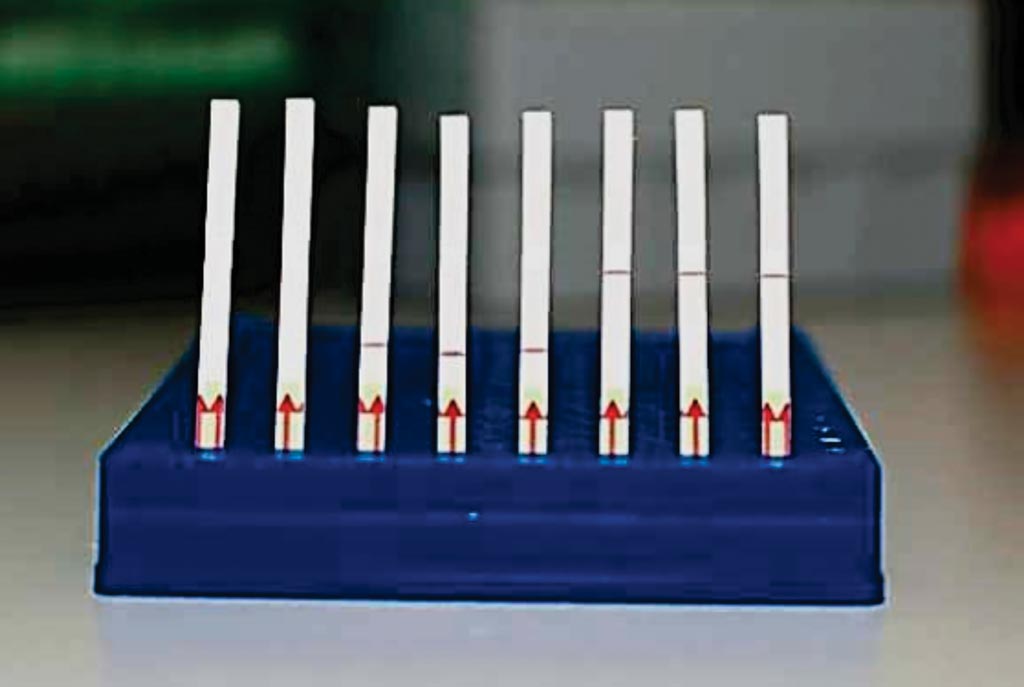Diagnostic SHERLOCK Optimized for Rapid Viral Detection
By LabMedica International staff writers
Posted on 08 May 2018
New technique enables SHERLOCK to detect a virus directly in bodily fluids, eliminating a step that required laboratory equipment and expanding the platform's potential to quickly and cheaply track pathogens such as Zika during an outbreak.Posted on 08 May 2018
The platform can now be used to detect viruses directly in clinical samples such as blood or saliva, eliminating a processing step that previously required a laboratory environment and professionally trained personnel. The development primes SHERLOCK for use in areas where special training and clinical laboratories can be challenging to access.

Image: A collection of SHERLOCK paper test strips: Unused paper strips (Left); Paper tests displaying a negative SHERLOCK readout (Middle); Paper tests displaying a positive SHERLOCK readout (Right) (Photo courtesy of Broad Institute of MIT and Harvard).
Scientists at the Broad Institute of the Massachusetts Institute of Technology (MIT) and Harvard Medical School (Cambridge, MA, USA) has also streamlined SHERLOCK's (Specific High-sensitivity Enzymatic Reporter unLOCKing) capabilities to distinguish related viral species from one another and demonstrated the platform's ability to identify clinically relevant mutations, such as a small mutation in Zika virus that has been associated with microcephaly.
The SHERLOCK diagnostic platform uses a programmed Cas13 enzyme paired with reporter molecules to indicate the presence of a genetic target, such as a virus. Until now, a crucial preliminary step for SHERLOCK involved extracting and isolating nucleic acids from patient samples, which typically requires a laboratory and trained personnel, making it difficult to accomplish in the field.
The team developed a simpler method that allows Cas13 to detect its target directly in bodily fluid samples such as saliva or blood. The process is called HUDSON, or Heating Unextracted Diagnostic Samples to Obliterate Nucleases. It consists of a rapid chemical and heat treatment used on the samples in order to inactivate certain enzymes that would otherwise degrade the genetic targets. The processed clinical samples can then be run through the SHERLOCK procedure, and the final detection results, positive or negative, can be easily viewed on the paper strip. The whole pipeline can be completed in less than two hours.
By pairing HUDSON and SHERLOCK, the team was able to detect Dengue virus directly in patient samples of saliva and blood serum. The platform could also detect Zika virus particles that had been added to healthy blood and urine samples. Additionally, the team designed SHERLOCK reagents that make it even easier and faster to distinguish multiple related viral species (Zika, Dengue, West Nile, and yellow fever) from one another. These improvements are particularly useful when a patient has general symptoms, such as a fever, that could be caused by more than one virus.
Pardis C. Sabeti, DPhil, MD, a professor and senior author of the study said, “Rapid and sensitive tools are critical for diagnosing, surveilling, and characterizing an infection. We've taken the SHERLOCK technology and optimized it in the context of these actual applied biological scenarios.” The study was published on April 27, 2018, in the journal Science.
Related Links:
Broad Institute of the Massachusetts Institute of Technology
Harvard Medical School














